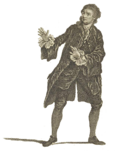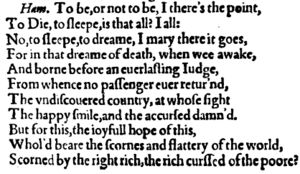Быть или не быть | это... Что такое Быть или не быть? (original) (raw)

Монолог Гамлета «Быть или не быть…» в первом кварто 1603 года
To be, or not to be («Быть или не быть…») — название известного монолога (более точно — солилоквия) Акта III Сцены I пьесы «Гамлет» Уильяма Шекспира (написанной примерно в 1600 году).
В популярной визуализации произнесение полилога сопровождается фигурой Гамлета, Принца Датского, задумчиво держащего череп Йорика (Yorick, «Бедный Йорик, я знал его, Горацио…»), хотя это происходит совсем в другой части пьесы.

Делакруа, «Гамлет и Офелия», Акт III Сцена I
Также важно отметить, что Гамлет не один на сцене в момент произнесения своего монолога (это стандартно для полилога) — также на сцене Офелия, Полоний и Король (разные постановщики лишь по разному разворачивают Гамлета — либо он смотрит на Офелию, либо на Короля и Полония).
Содержание
- 1 Оригинал
- 2 Интерпретации
- 3 Влияние
- 4 Другие источники
- 5 Влияние на культуру
- 6 Примечания
- 7 Литература
- 8 Ссылки
Оригинал
 |
To be, or not to be, that is the question;Whether 'tis nobler in the mind to sufferThe Slings and Arrows of outrageous FortuneOr to take arms against a sea of troubles,And by opposing, end them. To die, to sleep;No more; and by a sleep to say we endThe heart-ache and the thousand natural shocksThat flesh is heir to — 'tis a consummationDevoutly to be wish'd. To die, to sleep;To sleep, perchance to dream. Ay, there's the rub,For in that sleep of death what dreams may come,When we have shuffled off this mortal coil,Must give us pause. There's the respectThat makes calamity of so long life,For who would bear the whips and scorns of time,Th'oppressor's wrong, the proud man's contumely,The pangs of dispriz'd love, the law's delay,The insolence of office, and the spurnsThat patient merit of th'unworthy takes,When he himself might his quietus makeWith a bare bodkin? who would fardels bear,To grunt and sweat under a weary life,But that the dread of something after death,The undiscovered country from whose bournNo traveller returns, puzzles the will,And makes us rather bear those ills we haveThan fly to others that we know not of?Thus conscience does make cowards of us all,And thus the native hue of resolutionIs sicklied o'er with the pale cast of thought,And enterprises of great pitch[1] and momentWith this regard their currents turn away,And lose the name of action.[2] |  |
|---|
Интерпретации
- Немецкий философ Артур Шопенгауэр так отзывался об этом монологе: «Наше состояние столь горестно, что ему несомненно следует предпочесть полное небытие. Если бы самоубийство действительно сулило нам его и перед нами в полном смысле слова стояла бы альтернатива „быть или не быть“, то его следовало бы, безусловно, предпочесть как в высшей степени желательное завершение» (73. С. 424). «Но люди, — пишет Шопенгауэр, — имеют обыкновение не связывать смерть с абсолютным уничтожением; не было еще ни одного человека, кто бы не желал дожить до завтрашнего дня.» (426)[3]
- Независимо от того, акцентируется ли интерпретация монолога на «жизнь-смерть» или «действие-бездействие», темы поднятые в солилоге (и в целом во всей пьесе Шекспира) часто используются для сравнения Принца Датского с экзистенциалистами XX века.
Влияние
- Часто считается, что написание этого монолога (солилога) Шекспира вдохновил его современник (более точно — предшественник) — драматург Кристофер Марлоу, частично перефразировав линию из его последней пьесы — «Эдуард II» (Farewell, … and, as a traveller, / Goes to discover countries yet unknown., ср. с монологом в переводе М. Лозинского — «Безвестный край, откуда нет возврата»)
Другие источники
В первом кварто Шекспира монолог приводится в следующей форме:
Оригинальный текст (англ.)
Влияние на культуру
- Фраза часто обыгрывается в различных шуточных вариантах. К примеру: two beer or not two beer («два пива или не по два пива»), to beer or not to beer («пить пиво или не пить»).
Также популярен вариант to beer or not to be («пить пиво или не быть»). Здесь обыгрывается похмельный синдром. В русском варианте можно встретить «бить или не бить». Кроме того, существует выражение из алгебры логики, которое произносится по английски очень похоже на оригинал Шекспира — 2b 
 2b=?. Так же распространен вариант «Two be or not to be»
2b=?. Так же распространен вариант «Two be or not to be»
Примечания
- ↑ So the 2nd Quarto; the Folio has 'pith', which is a possible reading (Edwards, p. 159, note to line 86)
- ↑ Edwards, 3.1.56-88
- ↑ Цитируется по: Андреева И. С., Гулыга А. В. Шопенгауэр. — М., «Молодая гвардия» 2003. — 368 с. ил.
Литература
- Hamlet, Prince of Denmark. Philip Edwards, ed., updated edition 2003. (New Cambridge Shakespeare)
- Hamlet. Harold Jenkins, ed., 1982. (The Arden Shakespeare)
- Lewis, C.S., Studies in Words. Cambridge UP, 1960 (reprinted 2002).
- Schopenhauer, Arthur, The World as Will and Representation, Volume I. E.F.J. Payne, tr. Falcon Wing’s Press, 1958. Reprinted by Dover, 1969.
- «Something Rotten». Jasper Fforde 2004
Ссылки
- Монолог «Быть или не быть» в русских переводах XIX—XX вв.
- Уильям Шекспир. Монолог Гамлета «Быть или не быть…» в оригинале и русских переводах XIX—XX веков в Библиотеке Максима Мошкова (переводы М. Вронченко, М. Загуляева, Н. Кетчера, Н. Маклакова, А. Соколовского, А. Московского, К. Р., П. Гнедича, П. Каншина, Д. Аверкиева, Н. Россова, М. Морозова, В. Набокова, М. Лозинского, Б. Пастернака, С. С. Богорадо)
 «Гамлет» Уильяма Шекспира «Гамлет» Уильяма Шекспира |
||
|---|---|---|
| Персонажи | Гамлет • Клавдий • Гертруда • Призрак • Полоний • Лаэрт • Офелия • Гораций • Розенкранц и Гильденстерн • Фортинбрас • Два могильщика • Йорик |  |
| Монологи | «Быть или не быть» • «What a piece of work is a man» • «Speak the speech» | |
| Литературные источники | Легенда о Гамлете • Испанская трагедия • Ур-Гамлет • Библиография пьесы | |
| Литературное значение | Крылатые выражения в пьесе «Гамлет» • Ссылки на пьесу «Гамлет» • Что он Гекубе, что ему Гекуба? | |
| Постановки | Розенкранц и Гильденстерн мертвы • Гамлетмашина • Опера «Гамлет» • Strange Brew • Гертруда и Клавдий • Постановка «Гамлета» 1911 года в МХТ | |
| Экранизации | 1907 • 1920 • 1948 • 1964 • 1969 • 1990 • 1996 • 2000 |
